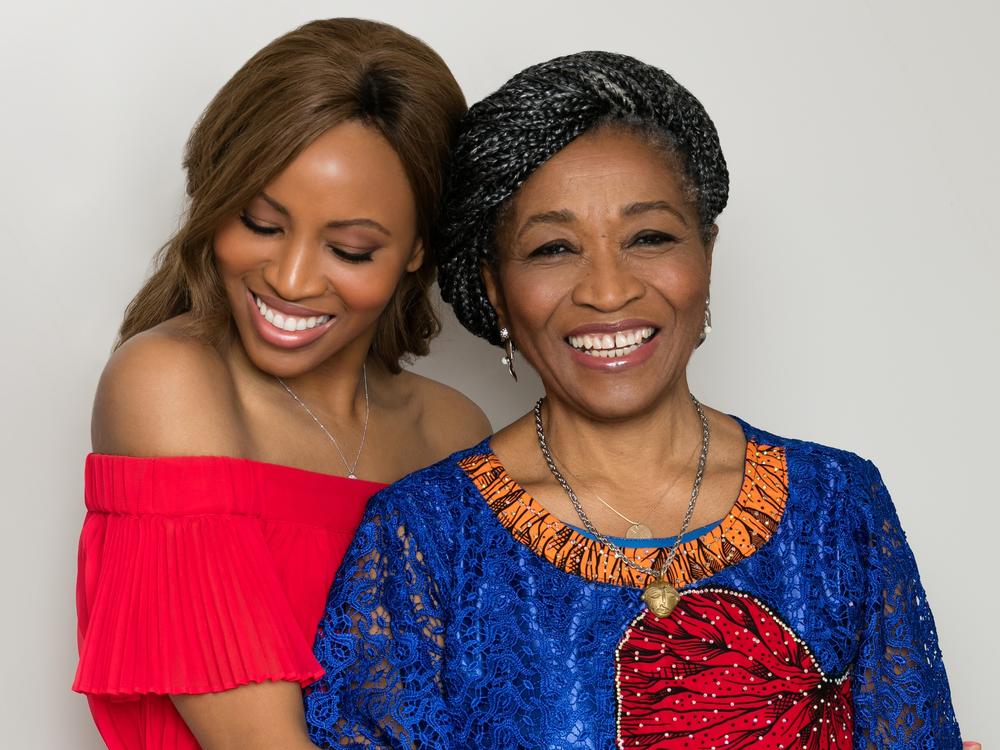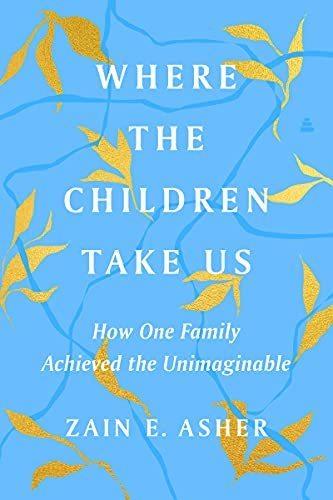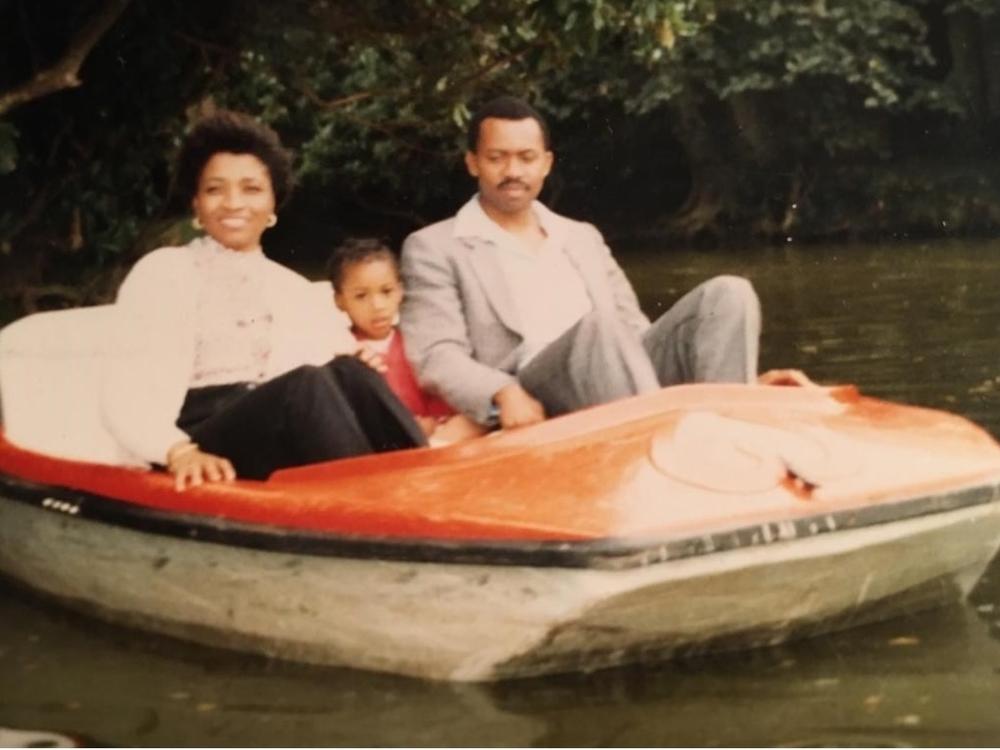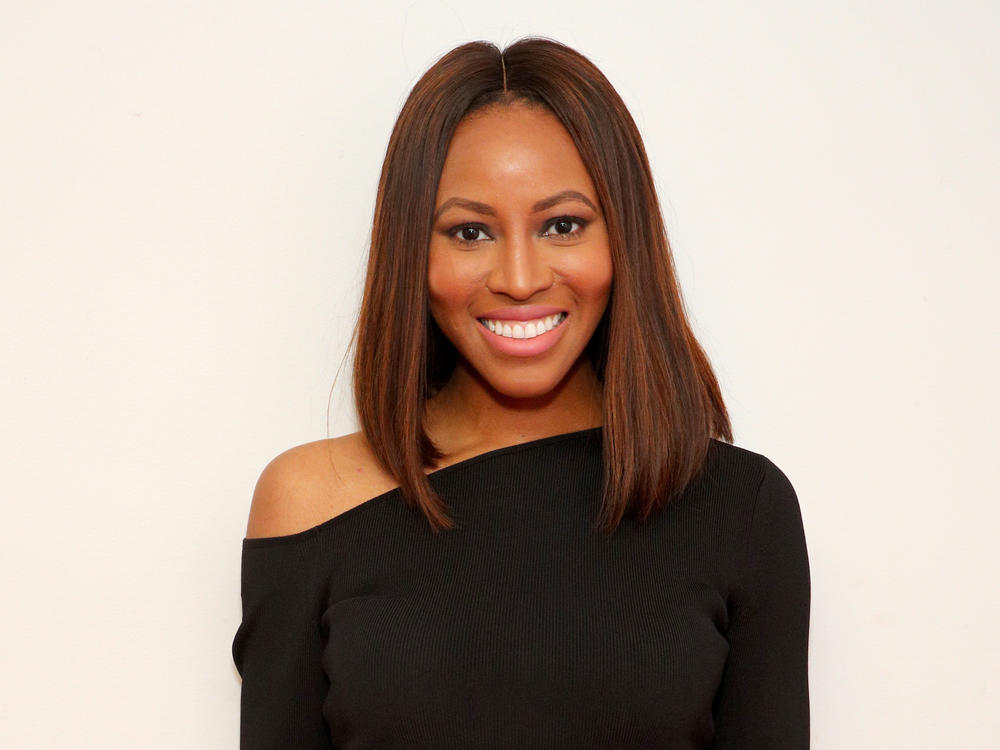Section Branding
Header Content
CNN's Zain Asher is grateful for her mom's tough love — even if it meant no TV
Primary Content
CNN international anchor Zain Asher was just 5 years old when her mother, a Nigerian immigrant who was living in London, received a devastating phone call.
Asher's father, a physician, and her 11-year-old brother Chiwetel Ejiofor had embarked on a road trip in Nigeria.
"The voice on the other end of the line basically says, 'Your husband and your son have been involved in a car crash. One of them is dead, and we don't know which one,' " Asher remembers.
Asher's mother, Obiajulu Ejiofor, raced 4,000 miles to Nigeria, where she learned that it was her husband, Asher's father, who had died.
"It was just such a difficult moment," Asher says. "On the one hand, yes, her son has been spared. ... But on the other hand, she's now having to plan a funeral for the love of her life."
Once back in London, Obiajulu, who was pregnant at the time, was faced with raising three (soon to be four) children on her own in a struggling neighborhood. Though she was dealing with her own grief, Asher says her mother went to extraordinary lengths to ensure that her children would be successful — including, when Asher was a teenager, using scissors to cut the power cord of the TV set. Obiajulu told her daughter that she could watch television again once she'd earned admission to Oxford.
The gambit paid off.
"That is how I got into Oxford," Asher says. "I didn't didn't get in because I'm a genius. ... I got in because my mother created an environment where I literally had nothing else to do but study."
Asher acknowledges that her upbringing might not be what many people would consider "fun." Nevertheless, she's grateful for the lessons her mother imparted.
"It wasn't the easiest childhood, but it prepared me for real life," she says. "I would take the childhood that I got every single time."
Asher is is the host of the CNN International program One World with Zain Asher. Her brother, the actor Chiwetel Ejiofor, was nominated for an Oscar for his role in 12 Years a Slave, and her other siblings are a doctor and a businessperson. Asher writes about her childhood in the memoir, Where the Children Take Us. The title of the book was inspired by a comment Obiajulu made when Chiwetel received an Order of the British Empire award at Buckingham Palace.
Interview highlights
On the confusion around the crash that killed her father
Initially ... the authorities thought that everyone had died in the crash instantly. But then, my Nigerian family in the villages had heard that everybody was killed and then they had heard after that that, "No, no, no, maybe one had survived. We're not sure. Well, maybe there was somebody that survived. We think the little boy had survived." And so there was so much confusion. And because the authorities thought that everyone had passed away instantly, everybody from the scene of the crash was taken to a morgue. And it was only when my father and my brother were taken to the morgue that the driver sort of opened the back of the truck and began unloading the bodies that he realized that my brother was still breathing.
On her mother's grief over the death of her husband
For the longest time, she locked herself in her bedroom, really finding it difficult to leave and finding human interaction quite difficult. She's obviously just emotionally broken as a person. So sometimes she would come out of her bedroom, you know, once once a day, maybe twice a day. She would make sure we had something to eat. And then she would go back into her bedroom, lock the door and just cry and cry and cry and cry for hours at a time. And even when she eventually went back to work, it was sort of the same thing. ... She ran a pharmacy and she would [go] into the bathroom she had up back and just cry. And then people would walk into this shop that was unmanned and [there was] no pharmacist to help them because the mother would be at the back crying. He was really the only man she'd ever held hands with, the only man she had ever kissed, you know, they met when she was 14. And so they had planned their entire lives together. They really were the loves of each other's lives. So it was not just, yes, her partner and her husband and the father of her children, but it was really her everything. And so, yes, broken is how I would describe it her emotionally for that point.
On how her mother reengaged with the family once her oldest brother started acting out
[My oldest brother] used to be a brilliant student. Before my father passed away, this is a kid that was getting awards at his school for best in math or best in science. And to see my brother ... go off the rails in that way by hanging out with the wrong crowds, getting expelled from school, talking back to his teachers, getting into fights at school was really a massive wake-up call for my mother, because she realized that her family's future was teetering on the brink. ... And that's when she began to really be a lot more present and focused in getting us back on track and keeping us focused on anything besides the empty chair at the dinner table.
On her mother teaching her children at home – in addition to sending them to school
She, at one point, asked my teachers for the school syllabus for the entire year so she could figure out what I was going to be learning in school in, say, a month or two, for example. And she would teach it to me at home beforehand so that by the time I learned it in school, I already knew it. And that was genius because ... it meant that my teachers thought I was much smarter than I actually was.
I remember going to school, and while everybody, was just learning their two times table or their three times table, I already knew my 12 [times table] by heart. And it was just such a simple thing to do to teach your child in advance of what they're learning in school. But it had the most profound impact on me because I learnt cause and effect in terms of studying. I understood at that point — this is at 7, 8 years old — I understood that what you put in is what you get out. And seeing the teachers sort of treat me differently, seeing myself given gold stars and various other scholastic awards just had this amazing impact on my self-confidence. And it really fueled my desire and my drive to come home, roll up my sleeves and study even more.
On how her mother felt about her brother, Chiwetel Ejiofor's, interest in acting
So one of Chiwetel's teachers persuaded her to watch him in an upcoming school play. I think it was Measure for Measure. ... She'd never really been to a Shakespeare play before in her life. But she sat there and, at the very end, Chiwetel came on after the curtain call and was bowing to the audience. And she saw the applause, the level of applause in the auditorium, in this all white auditorium in south London — to see people giving her son the standing ovation for nothing more than, in her mind, acting in a play — she realized there was something special going on there. ...
You know, I mention in the book that Nigerians love the idea of representing our culture well in other sort of environments, that's sort of a big deal for Nigerians. And so seeing my brother sort of honored in this way and given that kind of acclaim was a big deal for her. And so she came back home and she bought herself her first copy of a Shakespeare play and she read Measure for Measure. I don't know if she understood what she was reading. ... It's quite remarkable that she would teach herself Shakespeare in this way after seeing my brother perform.
On moving back to Nigeria when she was 9 and living with extended relatives there
In Nigerian culture, if you are Nigerian and you are raising your children in the West — so typically, in either England or the United States — at some point, usually before the end of high school, it is discussed and often acted upon that your children will be sent back to Nigeria to live with extended relatives for a brief period of time. Now, that brief period of time would be without you, without the parents. It would be usually with extended relatives. And it could last anywhere from one year to five years. But the idea behind it is that ... Nigerian values include discipline, hard work, resilience, respect for elders, and [Nigerian parents] really want to find a way to inculcate that, especially during a time in a child's life when they are still, quote-unquote, "malleable" ... usually by the age of 9, 10, 11, 12. ...
So I arrived. And, you know, my grandparents obviously didn't have much money, and so we were in a neighborhood called Abakpa-Nike, which is one of the poorest parts of Enugu, to the point where when I meet a Nigerian today and I say that I lived in Abakpa-Nike for two years, they are so shocked, and they're like, "My God, you're from there?" Because that part of the city was really poor. ...
When I was there, I witnessed ... one of my distant cousins who was living with my grandparents catch her own food, and it was a pigeon. And so coming from London, having to do that was really difficult. And I was getting a taste of what my mother had experienced during her childhood and what my grandmother had experienced during her childhood as well. ...
You cannot go through that and not be a different person. If you come from London or you're living in New York and you experience two years in that kind of environment, you are a changed person as a result, and you take nothing for granted afterward. So it did have the desired effect, but it was rough.
On how her mother's "8-hour" rule has impacted her career
My mother, growing up, would make us divide our day into three equal parts. ... Eight hours for sleeping, eight hours to be spent at school, generally, or at work if you're an adult. And the last eight hours would be spent working toward our dreams. And that was her idea just to give us focus, give us discipline. And her whole philosophy was that everybody, generally speaking, spends seven or eight hours sleeping. Generally. Obviously, there are exceptions. And everybody, generally, if they're lucky enough to have just one job, will spend roughly eight, maybe nine hours working a day. So the only thing that differentiates you from the next person is how you spend the last eight hours of your day. And so when it came to becoming an adult and exploring the working world in the United States, that was something I really remembered, like, understanding the importance of accounting for my time.
When I was young and single, before I had children, I could really focus on the last eight hours of my day and using it to prepare in advance. But obviously, having kids changes that, because the last eight hours of your day are not yours anymore.
Sam Briger produced and edited this interview for broadcast. Bridget Bentz, Molly Seavy-Nesper and Marc Silver adapted it for the Web.
Copyright 2022 NPR. To see more, visit https://www.npr.org.




